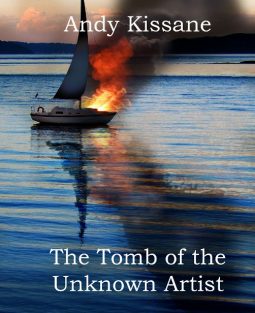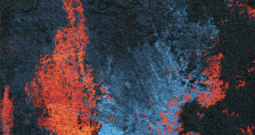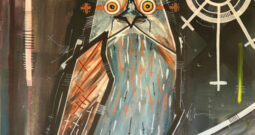from the editor's desk

Review of ‘The Tomb of the Unknown Artist’ by Andy Kissane
Kissane, Andy. The Tomb of the Unknown Artist. Waratah: Puncher & Wattmann, 2019. RRP $25.00, 88pp, ISBN: 9781925780376.
Patricia Johnson
Parched lips, eyes firmly shut, your white hair combed
back against the pillow. I watch your mouth slowly opening
as I balance the spoon and tip the clear wobbling
liquid onto your tongue. (16)
This is from ‘Waiting Beside You’, a poem about a dying mother detailed with small moments that create in the reader a calm pool of compassionate feeling, for both the mother and her watching progeny. It’s a good sample of how Andy Kissane writes, clearly and feelingly.
The volume is divided into four sections. I found the poems in each part fresh, original and with the ability to surprise. In ‘Thunderstorm’ the poet presents the writer’s dilemma perfectly with this short extract:
I cannot recreate the tumbling, frenetic rain,
which is now easing. Nor can I precisely convey the delight
of finding a whooshing roaring tumult sounding ahead of me, (36)
‘A Wall of Eyes’ is poem about twin brothers meeting Dr Mengele, and despite the feeling of dread any mention of Auschwitz sets in motion (as this does in the very first line), the ending still hits you with thump.
I did not understand. Later, gazing into a mirror,
I saw my brown eyes. I was lucky. I see that now. (39)
There are brutal poems about the Vietnam War. The thoughtful ‘After the Deluge’ could be more aptly named ‘after the bombs’. In the midst of this straightforward war poem three words hit me with an unexpected force that stopped me in my tracks; made my eyes cease racing on, as they generally insist on doing, to the next line–and forced me to consider, as here:
— lucky .
to survive the shock and awe unleashed upon them—
the poisons in the food chain, the shrinking wetlands, (40)
Other good poems also have the occasional fabulous line, e.g. from ‘Barangaroo Capriccio’ about a flooded Sydney:
Oh Atlantis. Oh, Packer and Gomorrah. Nero was not
the only one who fiddled while Rome burned. (83)
Oh brilliant. Oh, condemnation, well-deserved.
‘Shooting footage,’ a poem about schoolyard bullying and a low point in human behaviour, is a high point in the volume. I was struck by the tale, ignoring the form and its facets because I was so overtaken by the callous viciousness of what was being witnessed.
‘Beached Dreams’ addresses the issues around refugees on Christmas Island and is so good it’s worth quoting at length.
we drive shards of broken tidewood into their beating hearts,
sealed by signature
of our feckless leaders, written with such pragmatic
cowardice, with such unfeeling stubbornness
that the words choke as they begin—‘Unknown human’—
the ink bleeds and fades
in a sea strewn with the wreckage of decency,
the withdrawal of compassion, the failure
of a nation to face its fear, to understand that, like all of us,
they come in the hope of a better life. (45)
In this collection, the poems are accessible, easy to get the gist. I like the way Kissane uses sentence structure, a subject, a verb and an object. So call me antediluvian, but such structure constitutes a way to make sense, to give the message, whatever it may be, lucidly. Kissane is a poet who gets this and creates his poems in whatever form suits the unfolding story or idea.
In the last section we come to the artist poems, the poet’s attempt to imagine his own creative practice in a different form, in another head. My favourite from here is ‘Housing the Mind’, an imaginative leap that examines what sort of mind constructs what sort of house to suit what sort of creativity. Although some of the poems are loaded with pain, even those are beautiful: as a reader you sense that, for a change, someone is really trying to find the truth and express it. Kissane’s only agenda here is the truth, read it as you like, and for that reason you may feel, as I did, that you are more genuinely human, more connected, after reading this volume.
No wasted words here, no showing off how clever the author is. It’s original, well-expressed and full of meaning and therefore deserving of careful reading, whether you agree with the poet’s views or not.
Pat Johnson has had stories and poetry published in dotdotdash, Re-Placement, Lines in the Sand, Windmills, and Creatrix as well as in online journals. She has been an editor for dotdotdash magazine, covering poetry and short stories. She is immediate past President of the Fellowship of Australian Writers, Western Australia. Her latest project is a ghost story of novella size. Pat has degrees in Social Science and Creative Writing; she is currently studying the History of Art and Fine Arts at UWA.





